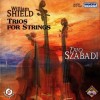传记
William Shield (5 March 1748 – 25 January 1829) was an English composer, violinist and violist who was born in Swalwell near Gateshead, the son of William Shield and his wife, Mary, née Cash.
Shield was first taught music by his father but, after both he and his mother died while Shield was still a child, he was apprenticed to a shipbuilder in South Shields, continuing however to study music with Charles Avison in Newcastle upon Tyne.
He became a noted violinist in Newcastle's subscription concerts before moving to Scarborough to lead a theatre orchestra. In 1772, he was appointed by Felice Giardini to play violin in the opera at Covent Garden (now the Royal Opera House), and from 1773 he was principal violist there.
On 21 February 1776 he was in Durham, where he attended the meeting of the city's masonic lodge at the Marquis of Granby tavern. The lodge Minutes indicate that he was by this date already a member of the St. John's lodge in Newcastle. He later also became a member of the Sunderland Phoenix lodge. Details of the frequency of Shield's attendance at these north-east lodges is not yet clear, but can only have been occasional, given his career in London.[1]
Shield also worked as a composer for Covent Garden and, in that capacity, he met Joseph Haydn. In 1817, he was appointed Master of the King's Musick. Like Haydn, not to mention several other composers of his time, Shield was a great plunderer of folk tunes (in his case mostly from his native Northumbria).
Shield's compositions include a large number of operas and other stage works.[2][3] These included one on Robin Hood (1785, text by Macnally), as well as instrumental music, but he is principally known for his English light opera Rosina (1781). It was intended to be used as a light afterpiece to a more "serious" work sung in Italian. Such works were common at the time, although Rosina is the only one that has survived in the form of a complete score.
Rosina has a number of features associated with later English comic opera, and even modern musical comedy – including the use of English, spoken dialogue, lightness of theme, and the use of folk and popular medodies. At least to that degree, it may be regarded as one of the ancestors of the musical, and Shield as one of the first composers of musicals.







